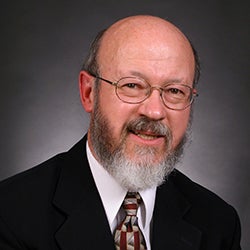Program extended by new $5 million federal grant has trained thousands of health care workers in Rhode Island
With more than 20 percent of its population over the age of 65, the fourth-highest percentage of residents over 85 in the country, and a fast-growing population of older adults diagnosed with Alzheimer’s Disease or other dementias, Rhode Island is poised to be designated a “super aging” state within the next year, highlighting the urgency for a healthcare workforce prepared to meet the unique needs of an aging population.
The Rhode Island Geriatric Education Center at the University of Rhode Island will continue to provide that elder care education, thanks to a new $5 million grant from the federal Health Resources and Services Administration, which has been funding the program to enhance geriatric training of healthcare professionals, students, patients, families, and caregivers since 1996. URI College of Health Sciences Professor Phillip Clark leads an interdisciplinary team of health care professionals and educators in a statewide initiative to develop an age- and dementia-friendly workforce to integrate primary and geriatric care, and improve health services for older adults.
“We’re one of the oldest states in the country and we are really on the cutting edge of developing geriatric education to address the expanding population of older adults,” said Clark, a professor of gerontology and director of the Rhode Island Geriatric Education Center and the program in gerontology at URI. “Similarly, we have a growing percentage of Rhode Islanders who have some form of dementia, so we really see this grant as an opportunity to be at the forefront of responding to the health-related needs of older Rhode Islanders.”
The Geriatric Workforce Education Program brings together educators from URI’s colleges of Health Sciences, Nursing and Pharmacy, as well those from Brown University and Rhode Island College, to develop programs such as Project ECHO, a Zoom-based education platform; webinars that will be delivered live as well as archived on the RIGEC website; and in-person seminars at clinical sites and community health centers around the state. Topics will focus on age-friendly education that focuses on “the four M’s” of health care for older adults—Medication, Mobility, Mentation, and what Matters (patients’ personal goals of care).
Project ECHO supports primary care providers, nurses, social workers, pharmacists and other clinicians in learning from experts as well as each other how to provide excellent care to older patients in their own communities. Students from URI’s three health colleges—as well as medical residents from Brown, and social work and nursing students from RIC—will also take part, helping ensure the next generation of health care professionals will be well versed in geriatric care when they begin their careers.
“Interprofessional education of health care providers is critical,” Clark said, noting the program has educated more than 6,000 front-line health care professionals over the last five years. “We coordinate programs that include students from all three health colleges. We’re working with people in health care systems providing care in primary care settings and in community health centers. URI is able to get all these people and organizations to collaborate on improving care for older adults. We feel proud URI has emerged as a leading educational provider in the state that has been able to assemble this diverse group of providers who want to work with the university with the overall goal to improve care.”
The workforce program will also concentrate on underserved populations, focusing on training workers in community health centers and primary care sites in underserved communities, where older adults are in particular need of services.
“In spite of having Medicare, people are still underserved. The federal government is putting a lot of emphasis on reaching out to these populations of medically underserved and marginalized older adults,” Clark said, adding he hopes to reach thousands more workers during the five-year period of the new grant. “This is a critical time for URI to be taking the lead. URI is going to be at the forefront of the educational vanguard for this program. If we educate providers about basics of geriatric care and they use those principles in practice with their patients, that will greatly improve the care of older adults.”
For more information on the program or to participate in training, email Clark at pgclark@uri.edu or visit the Rhode Island Geriatric Education Center website.

